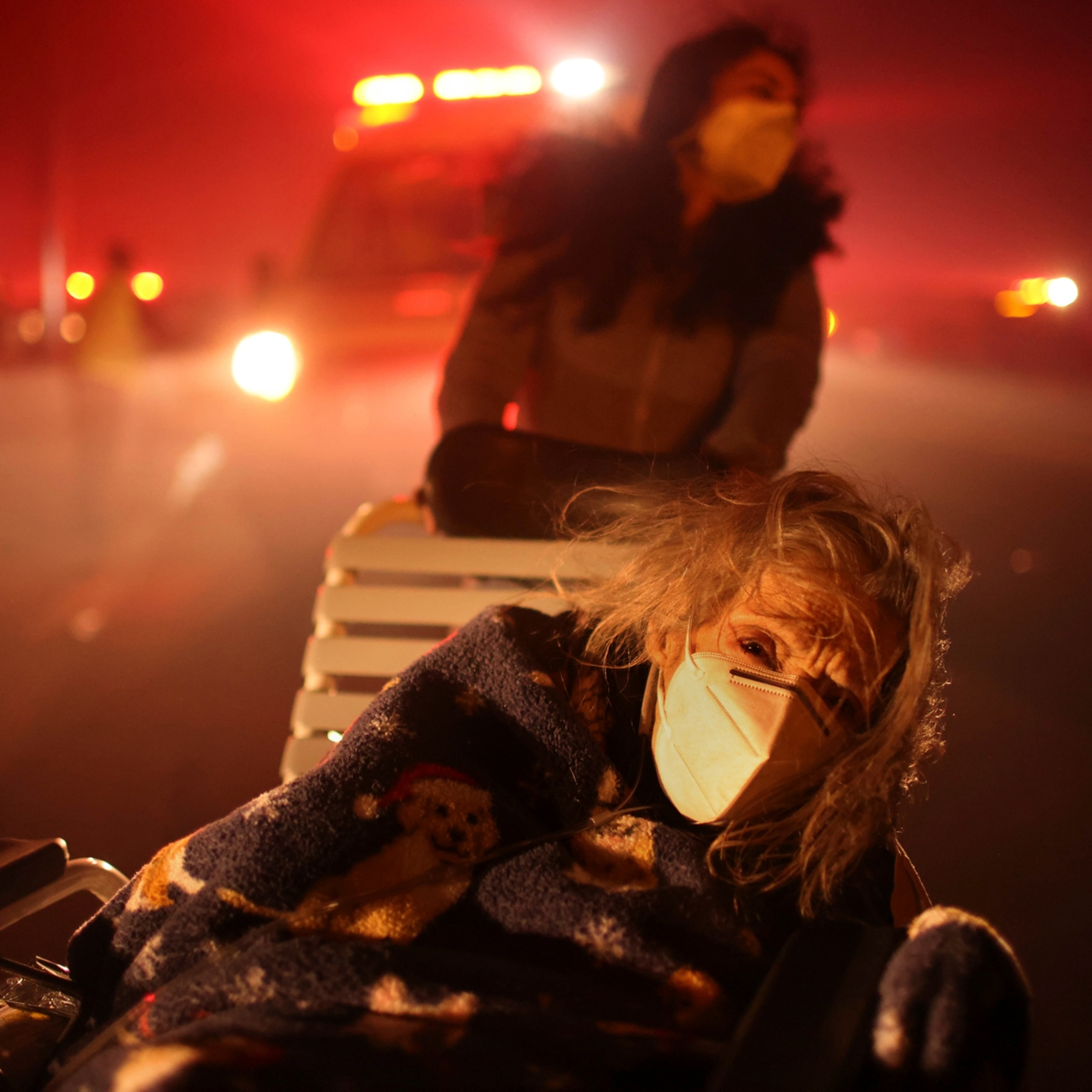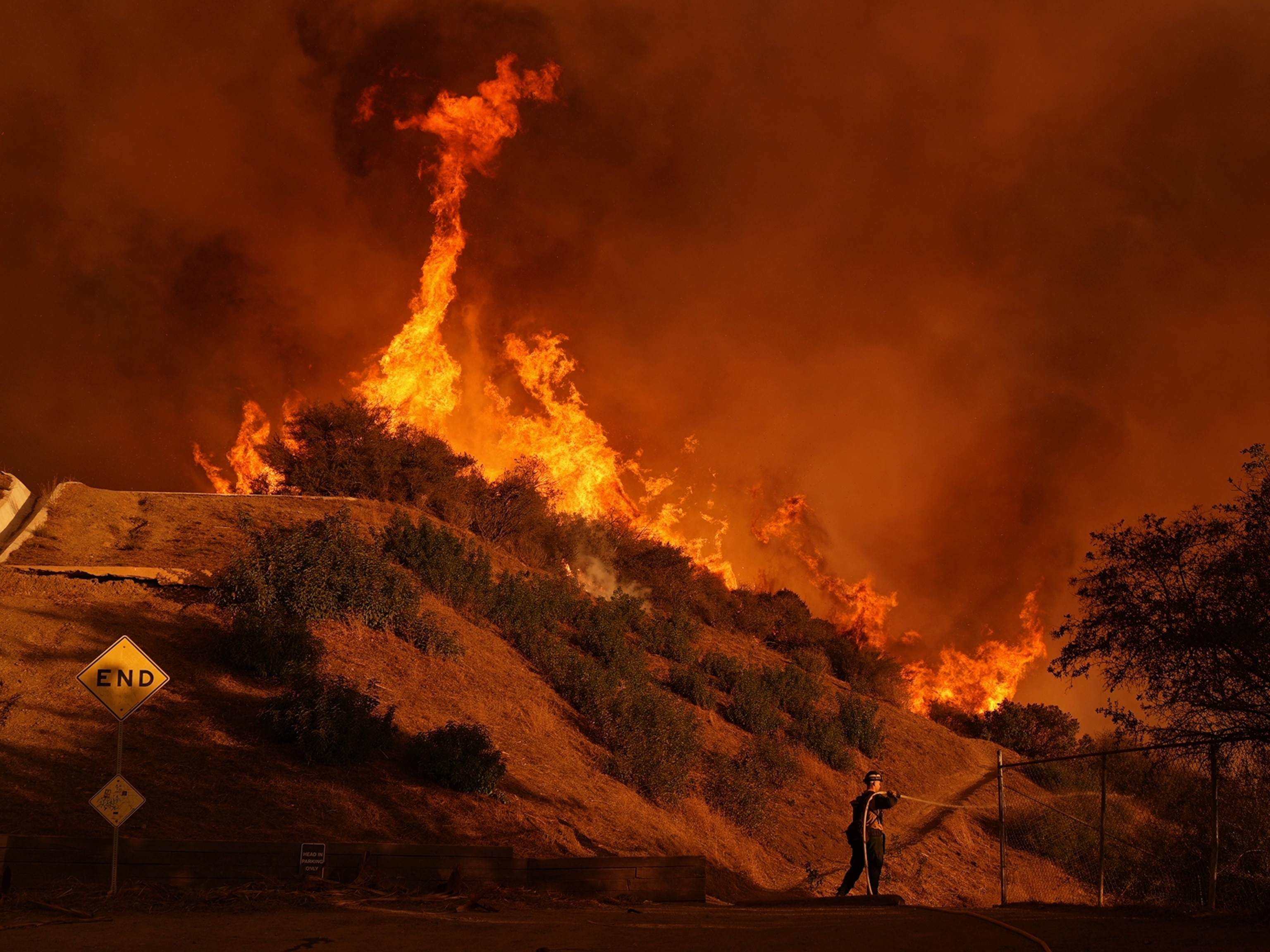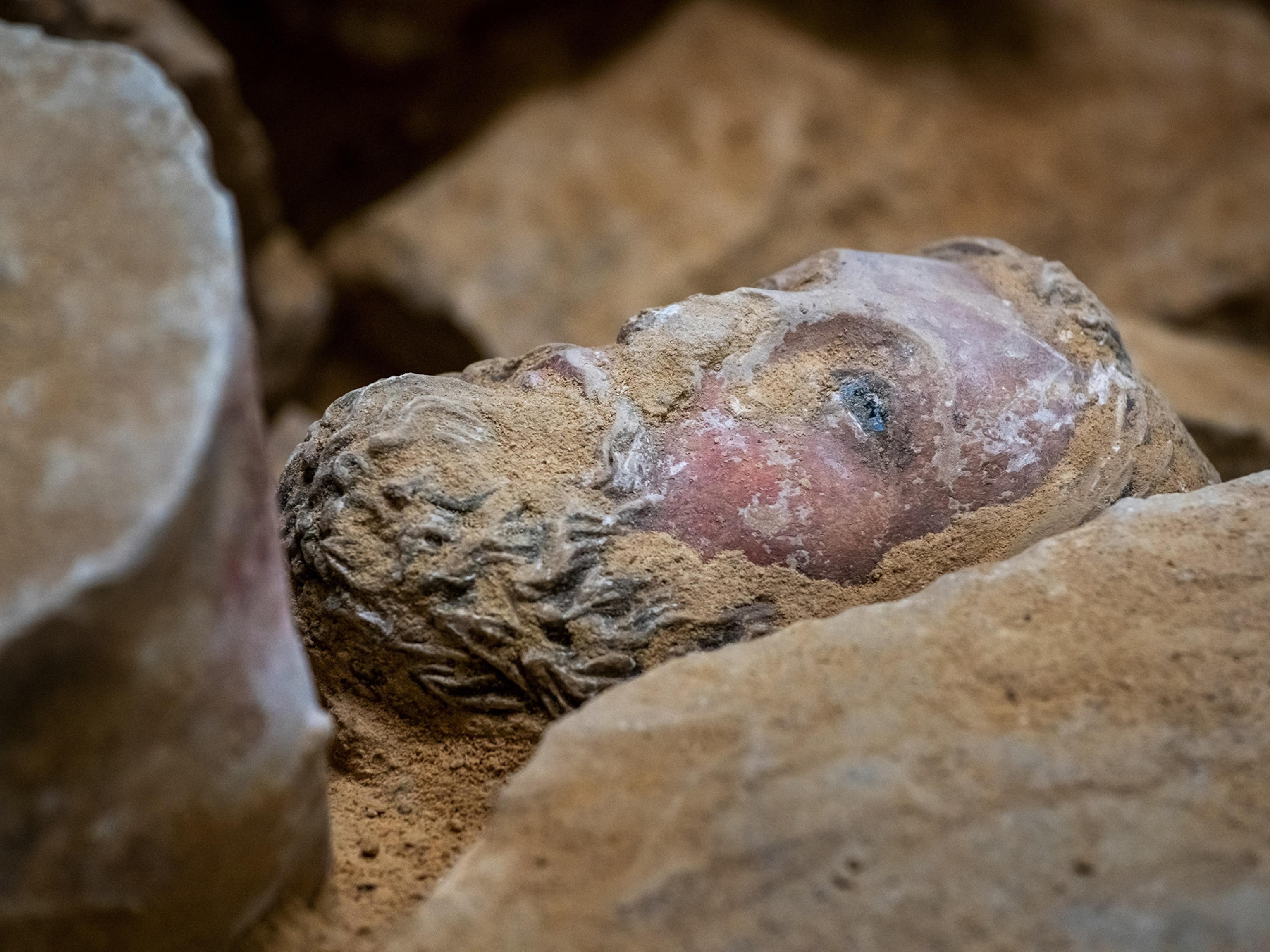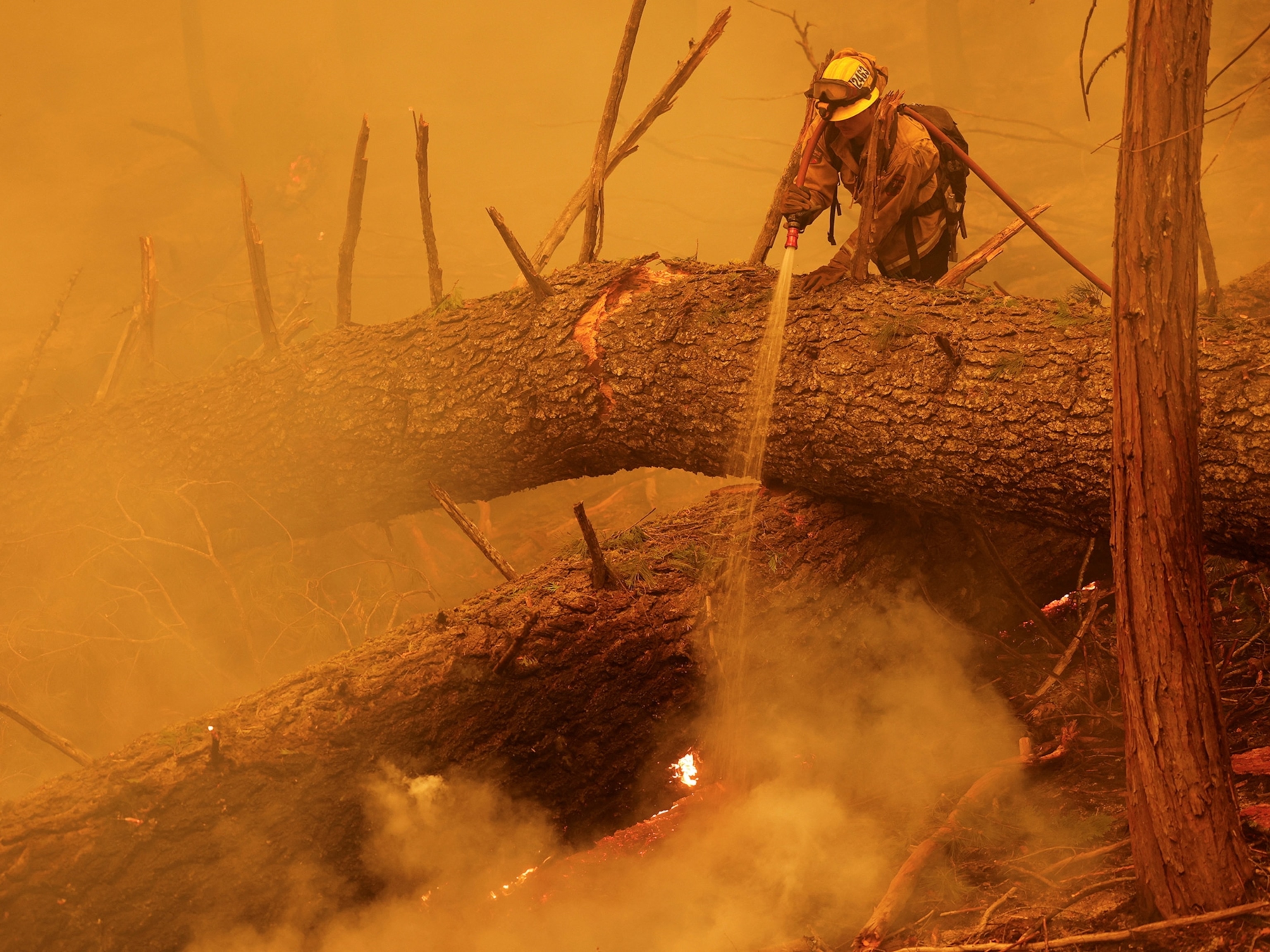Wildfires took her home. She returned on an outlaw mission to salvage a family treasure
Libby Dimick lost everything in the Oregon wildfires. In order to hunt for her most prized possession, she had to break the rules.
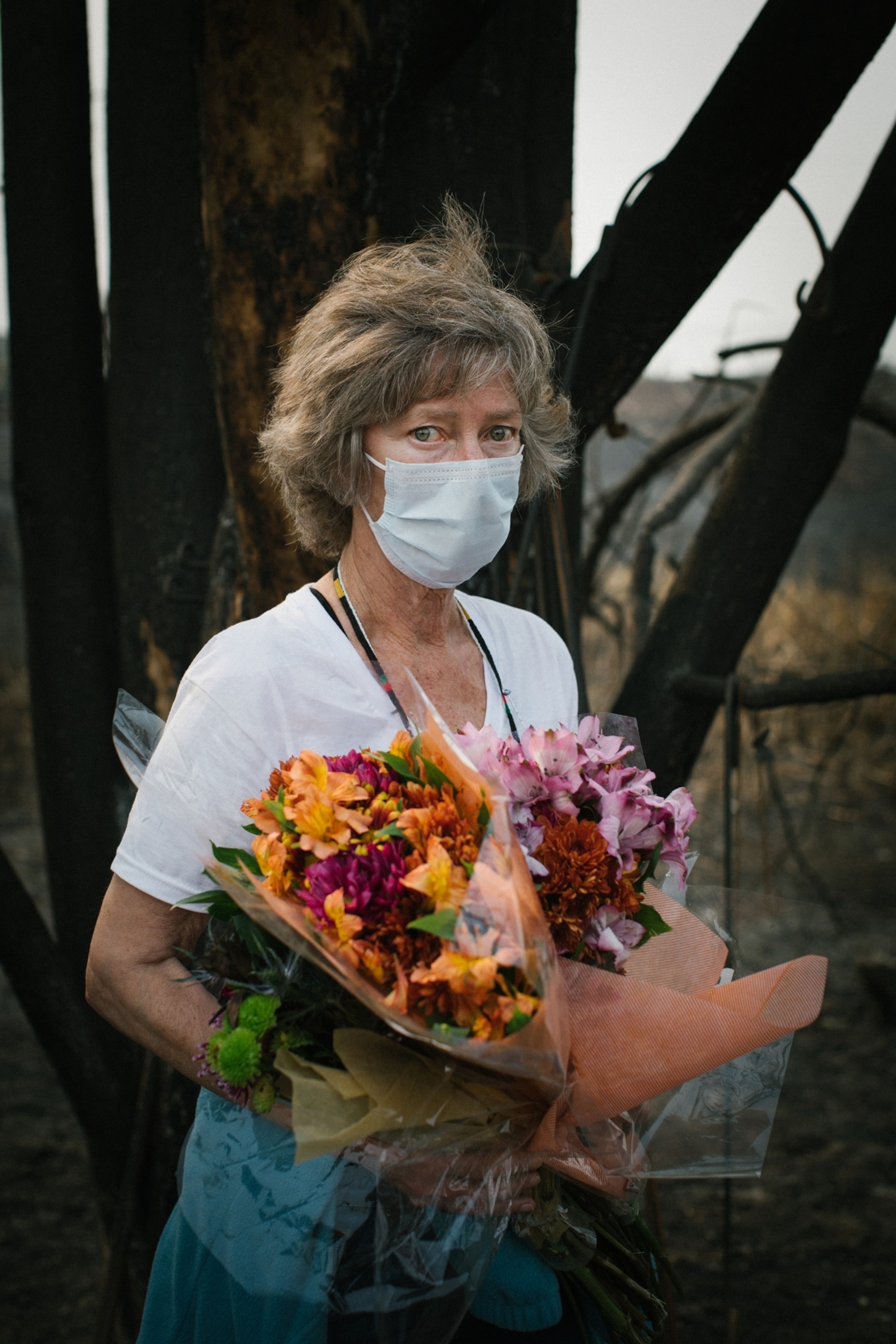
Talent, Oregon — On a hazy afternoon last week, an odd threesome headed toward a National Guard roadblock in southern Oregon: Libby Dimick, a 65-year-old nurse, clutching three flower bouquets; Logan Vaughn, a local handyman friend of hers; and Logan’s 15-month-old son Trace, whom Logan pushed in a stroller that also carried a shovel and a metal detector. The air was heavy with the smell of smoke and burnt plastic, the kind that sticks to your hair and clothes. The area had been closed off on all sides by the National Guard and the trio hoped to pass unnoticed.
As Libby led Logan toward the remains of Oak Valley, her 55-and-up community just outside the tiny town of Talent, she had two things on her mind: her cats and her great-grandmother’s diamond ring.
Nine days earlier, as the neighborhood was consumed by one of the dozens of fires raging across Oregon, the ring had been sitting on top of the dresser in Libby’s bedroom. Today the winding lanes of Oak Valley were lined with singed trees, burned cars, and house-shaped piles of rubble. The mayor of Talent would later describe the area as looking like “an atomic bomb went off.”
Libby loved Talent, a funky town with historic buildings along its main avenue and clusters of well-kept retirement communities and trailer parks. Libby loved the way the Talent Historical Society sold a special breed of Talent tomatoes every May. She loved the small coffee shop on Talent Avenue where she’d meet her friends each month for hours of catching up.
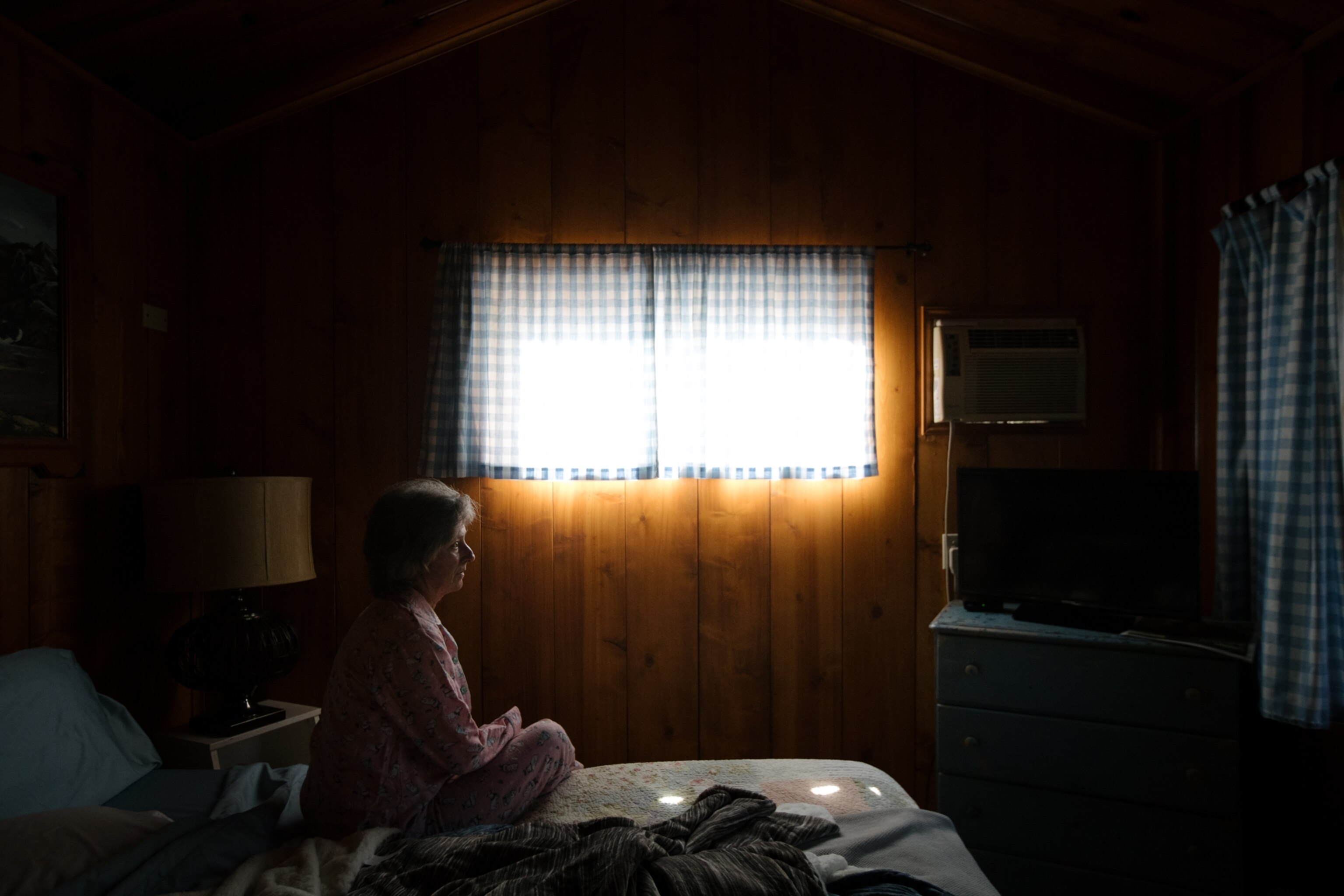
Oak Valley sat downhill from that coffee shop, just off Highway 99. The 75 wooden houses were distinctive among nearby communities of manufactured homes and trailers. Nearly five years earlier Libby had picked out a house on one edge of the property, where a protected wetland abutted the backyard. Trees muffled the highway noise outside her home, and kept it so cool that she rarely turned on the air conditioning. Libby had grown up in a farm outside Portland, but spent 30 years living on the coast of Florida. In Oak Valley, when she sat outside and listened to the breeze whistling through the trees, she could imagine still being near the ocean.
It was the afternoon of Tuesday, September 8, when Libby first heard reports of brush fires near Ashland, 20 minutes’ drive south of Talent. She was on post-op nursing duty at the Oregon Ear, Nose, and Throat Center in Medford, due north of both towns. She didn’t think much of the alert. Talent residents usually didn’t worry about wildfires because they were almost always contained to the mountains outside town. Bear Creek runs along the edge of Talent; the locals were more concerned about flooding.
Libby got off work early that Tuesday and headed out for errands. Then at 2:44 p.m., her phone blinked again: The smart devices controlling her home’s lights and thermostat had powered off.
She decided to go home to turn on her yard sprinklers, just in case. If things looked bad she’d grab the kennels from the garage, load her cats into the car, and leave. But as she turned onto the highway heading south, she spotted a plume of smoke ahead. Traffic came to a standstill, and Libby switched to backroads, passing the hemp, grape, and marijuana fields that keep the economy of southern Oregon afloat.
Firemen were directing cars away from the entrance to Oak Valley, but she managed to park her Subaru in a parking lot overlooking the neighborhood. She got out of the car and peered down. Fire was rushing along both sides of the streets below. She could see five fire trucks at the entrance, where the community clubhouse and the home next door were being consumed by flames.
Smoke billowed up from the whole neighborhood. Flames shot up the embankment where she stood. She paced back and forth, her hand over her mouth. “My kitties!” she cried. “My babies!” When a fireman found her and told her she had to leave, she asked if her house was OK—it was the white one, she said, at the end, near the wetlands. She couldn’t see it from where she stood, but she already knew his answer. “We did everything we could,” he apologized. “But it was too hot. We had to leave.”
Libby drove into town, sat on the curb of a laundromat and watched the smoke. She called her three best friends. Her house was gone, she told them. Her two cats were gone. Her town was gone. “What am I going to do?” she asked.
As she drove out of town, planes painted apartment buildings and houses with bright red fire retardant. A few helicopters hovered above a duck pond, taking turns filing up their buckets. The sky to the east above her home was black. The sky to the west was blue.
That night Libby stayed in a friend’s daughter’s living room, which she found she was sharing with six caged pet possums. She prayed the firemen would call to say her house had been spared and her cats were safe. She didn’t sleep. What if her house was the only one standing? Did she really want to live there after what she’d seen? The next day she moved into a motel along the Rogue River. Homeowners’ insurance would cover the bill.
Her best friends from work came by with surprise cocktails. She told them about the possums, and they laughed so loudly that other guests came outside. Nearly everyone staying at the motel had been displaced by the fires; they thanked her for the laughter. Her neighbors stopped by with a farmer’s market box stuffed with fruit, veggies, and baked goods. Another guest brought over a basket of chocolates and flowers. Libby forced herself to go back to work at the clinic, and the routine became a welcome distraction.
Libby knew, really, that her house was gone. She hadn’t seen it burn, but from where she was parked, she had watched as flames spread from house to house. She knew her cats had not survived, either—they always ran under the bed when scared. Still, she wanted to go back. The neighborhood had been closed, even to residents with an escort. The entire burned area was considered a crime scene; police are still investigating the source of what’s now called the Almeda fire. Experts estimate that 2,350 homes were destroyed over the course of 24 hours in Talent and neighboring towns.
Libby called the county sheriff’s office. An officer asked if her house was intact, explaining gently that they were allowing only people with still-standing homes to return briefly, to retrieve necessities like passports, medicine, and cash.
By the grapevine, Libby was hearing that other residents were picking around what remained of their houses, and that press and city officials were touring the area, too. She worried that anything left would be taken by looters, or—with much-needed rain in the forecast—washed away.
She couldn’t stop thinking about her great-grandmother’s diamond ring.
The ring had one delicate diamond centered in a bow of rose gold. Libby’s mother gave it to her when Libby was in her thirties. It was the first time she’d seen her mother remove the ring: She had wet her hands, slid it off, and told Libby it was time for her to have it. No one knew exactly how old it was, or how many generations of Dimick women had worn it. The ring only fit on Libby’s pinky finger, and since she washed her hands so frequently at work, she rarely wore it. Once, years back, when all her jewelry was stolen in a burglary, police caught the thief and recovered the ring. In her home in Oak Valley, she stored it in a stained glass jewelry box on her dresser.
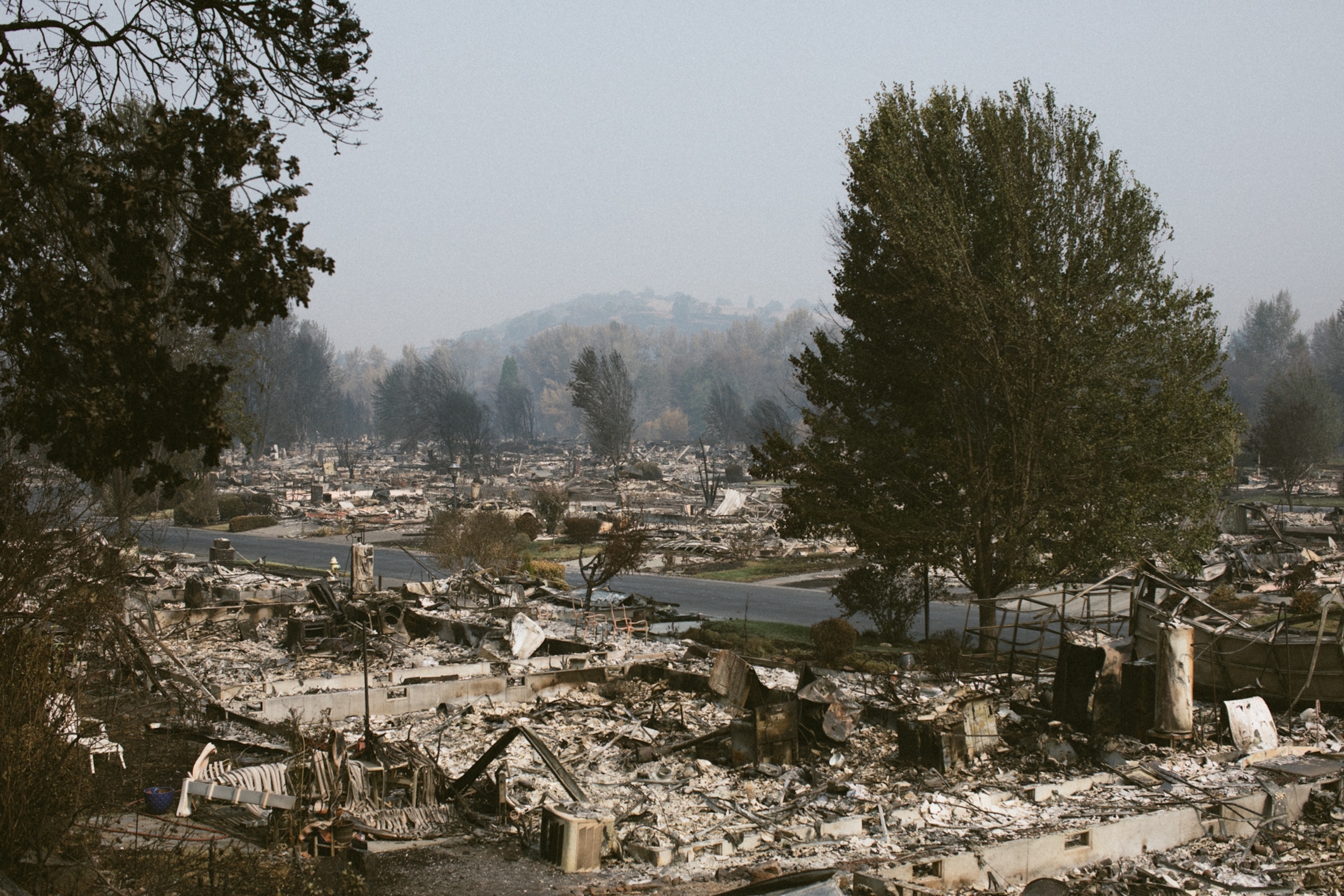
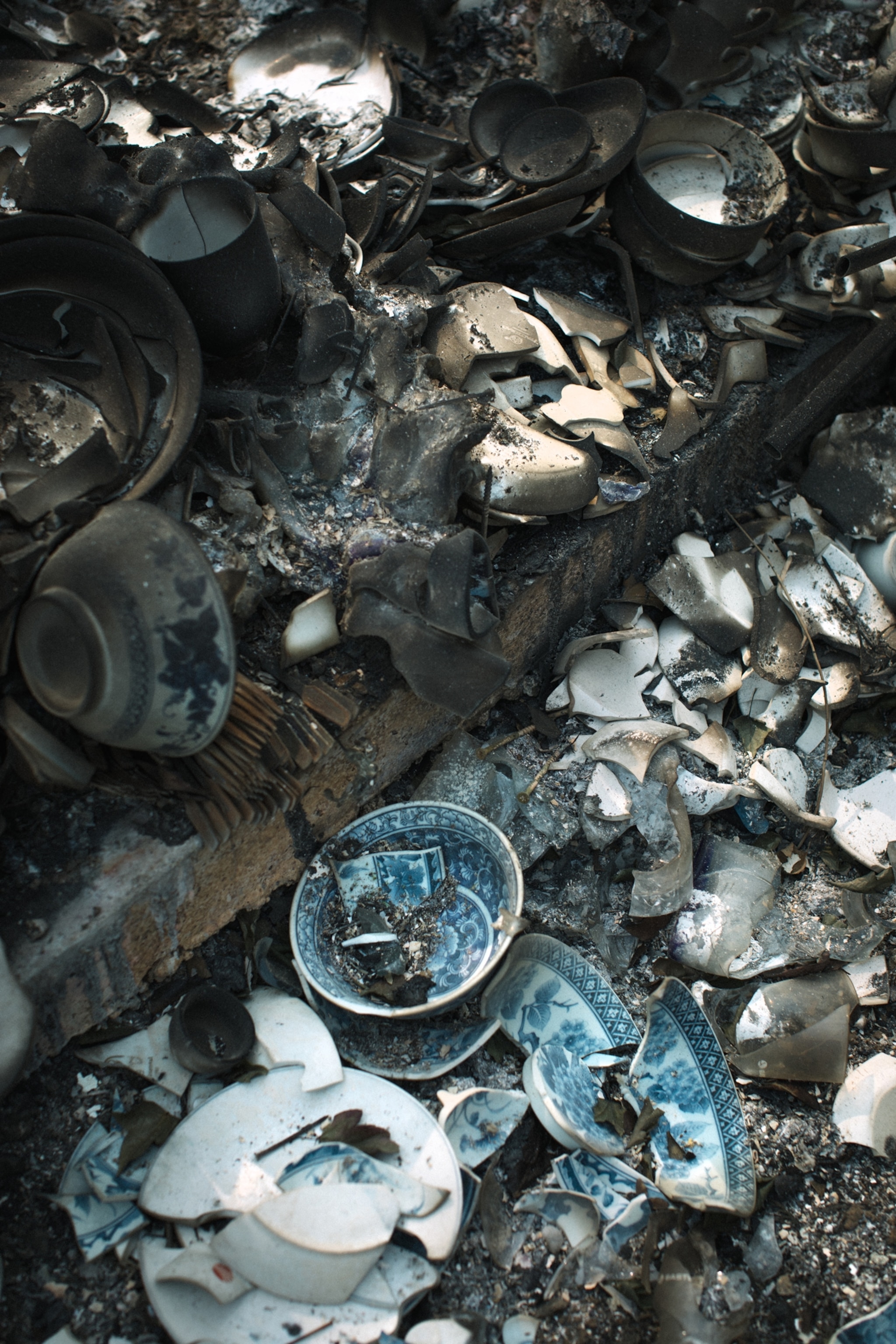
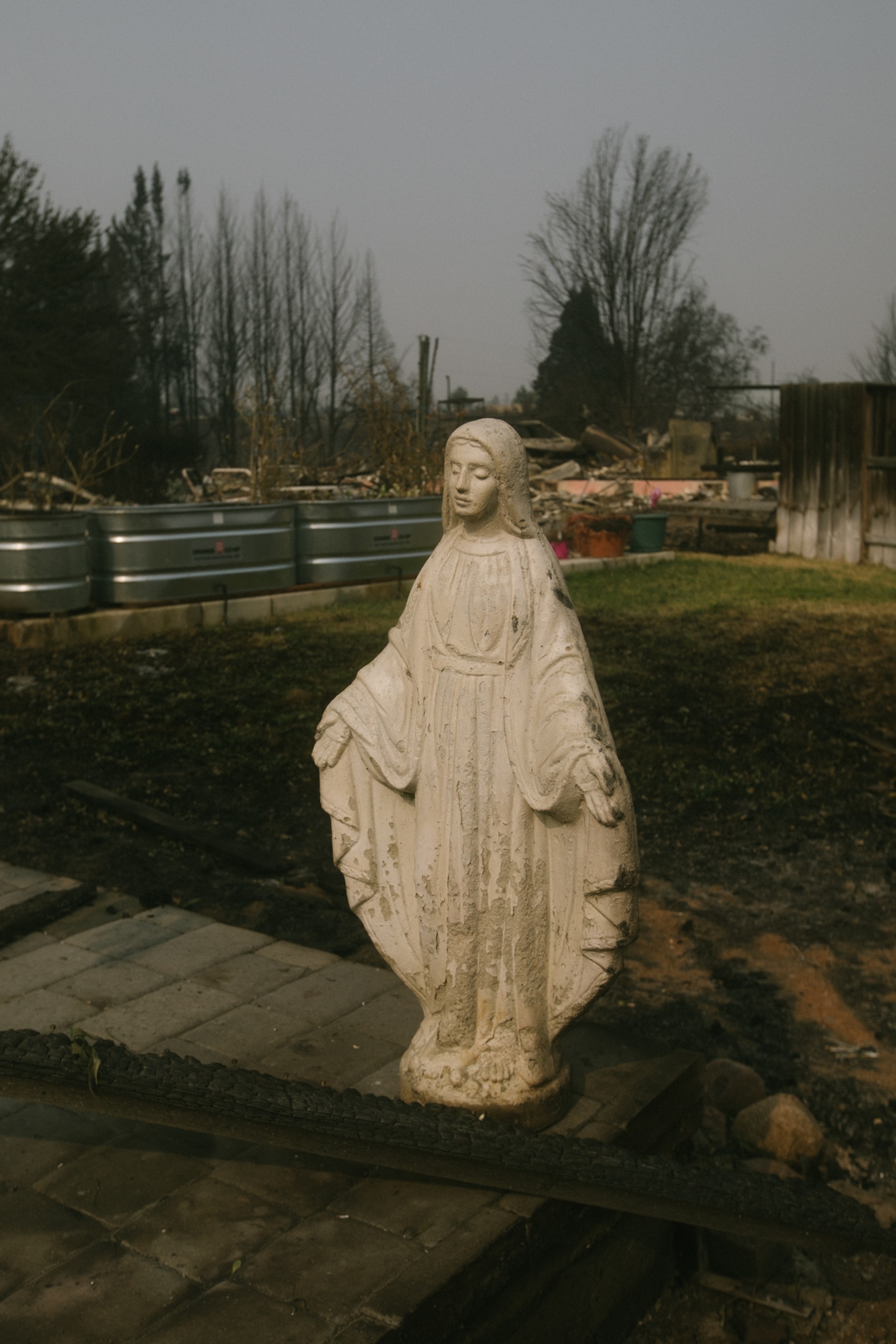
She understood there was probably nothing left of her house, but she couldn’t shake one idea: that a gold and diamond ring might have survived. She kept picturing it buried in the rubble, still intact. Then she got a text from Logan Vaughn, a self-styled gun broker and day trader who also did handyman jobs around her house. He had a metal detector, he wrote, and would gladly sweep the area for her to help search for any valuables. When he called a few days later, urging her to get ahead of the looters, she told him about the ring.
Now, nine days after the fire, on a Thursday afternoon, they were on their way. They would look for the ring. They would say goodbye to the cats; no one had seen them alive, and Logan brought a shovel in case they found remains to bury. Libby’s nerves were frayed. For days she’d steeled herself for a return home, and on this morning there was more bad news: police patrols were driving through the community, asking people to leave. Libby didn’t know what to do. She’d called the mayor, an acquaintance, and left an emotional voicemail: she needed this closure, she said. “I just want to bury my cats.”
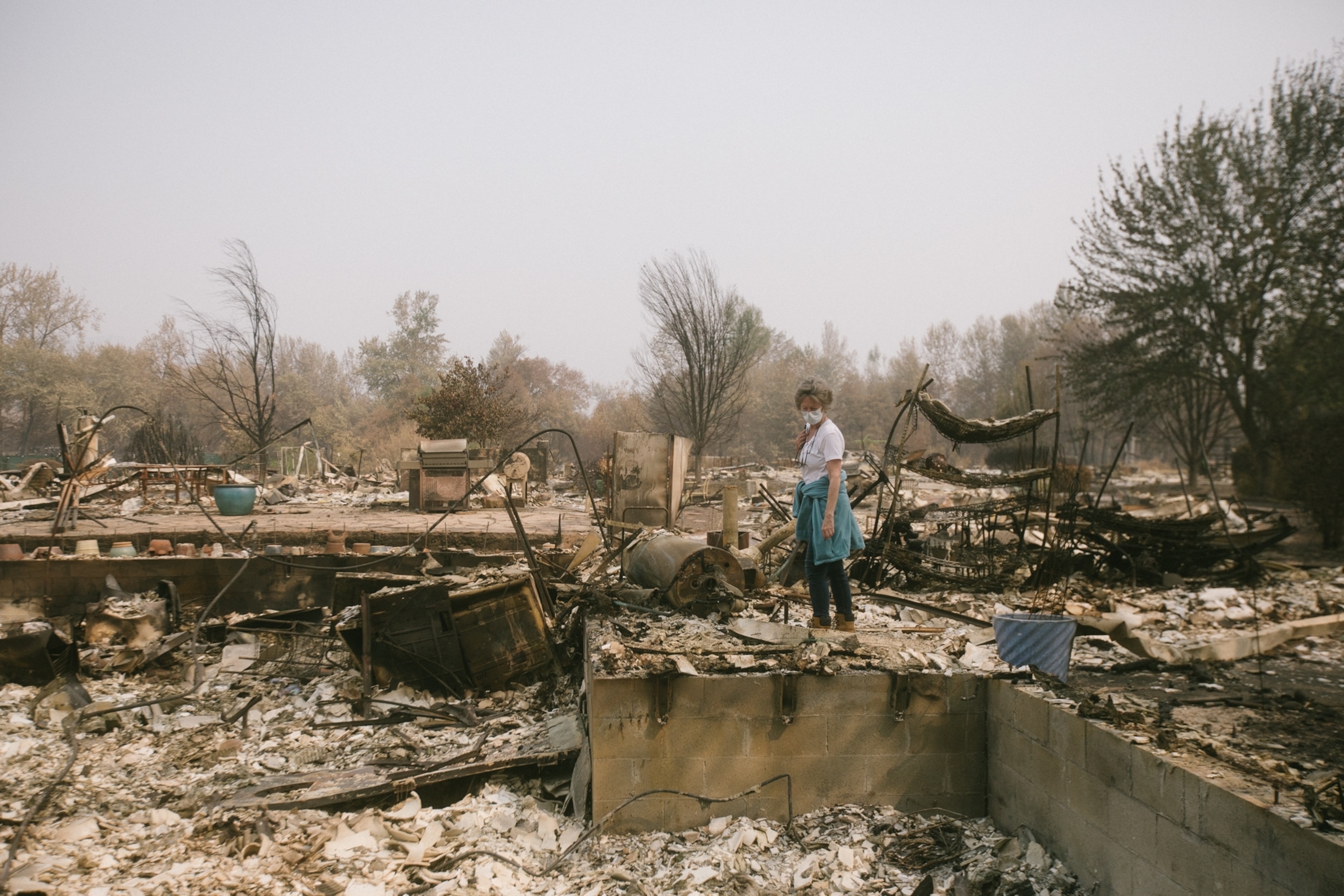
No one had responded to Libby’s messages, so at 1 p.m., the three of them—Libby, Logan, and his son Trace—crossed Talent Avenue and approached the barricaded street leading toward Highway 99 and into Oak Valley. Gates and traffic cones blocked the road. Two members of the National Guard stood watch. Libby and Logan walked casually, attempting discretion. The handle of the shovel stuck two feet above the stroller. The metal detector poked out from a basket underneath.
A guard peeled off from the post and asked Libby if she had a permit to enter. Libby froze. The guard was apologetic but firm. The pair swiveled the stroller around, headed back, and made a sharp right behind a local theater, parallel to the street they’d just been denied access to. Libby shoved her bouquets into the stroller and they beelined toward Oak Valley. The National Guard had cut off traffic on either end of Highway 99, leaving it eerily empty. Libby and Logan crossed unseen, passing an unscathed apartment building and a destroyed strip mall.
Libby led them into the parking lot of a local gym overlooking her neighborhood. Nine days ago she’d stood in this spot and watched it burn. The fire had later reached here, too, and the building was a scorched shell, with only a few pieces of gym equipment left standing. From above, they saw a white patrol car drive out of Oak Valley. It was lunchtime and no one else seemed to be around.
“What do you think?” she asked Logan.
“You’re the boss.”
“Let’s go.”
They followed the street down to the entrance of Oak Valley. The community clubhouse had once hosted cocktail parties, game nights, and monthly potlucks; it had a bookcase where residents could exchange titles. Now, as Libby and Logan walked past, all they could identify of the clubhouse was the pool and two rows of folding chairs. The trees that lined the streets were charred black. The sky was a hazy, forbidding gray.
At the end of the block, where Libby’s house once stood, an apocalyptic scene awaited them. There was no white fence, no stained glass window, no bird bath next to the front door. A cinderblock foundation ledge outlined the shape of the house. On one side, a row of ceramic pots sat unscathed; on the other was a half-melted collection of airline dishes that had been stored in the shed. Wire shelving units were the tallest structures still standing. Skeletons of appliances—coils from the stove, a gas fireplace vent—offered clues to the home’s original layout.
Libby paced the property slowly and silently, taking photos. She walked around the left side of the house and paced along the back edge. This was her bedroom. Her dresser had been in the far right corner, next to the door to the patio.
“What do you want me to do?” Logan asked.
He grabbed his metal detector from the stroller, snapped it together, and hopped over the ledge into the house. His boots crunched on debris. Logan had expected a pile of ash, but this was rubble—chunks of building material and wire coils mixed into layer upon layer of unrecognizable debris. It was likely several feet deep.
The detector beeped incessantly. It was obvious Logan’s plan wouldn’t work. He leaned over and picked up a tin container. Ash fluttered out of it. The baby started to cry and then was quiet once again. He would need a couple of sifter boxes, he said, and some friends to help.
Logan crossed over the cinderblock perimeter, put on a pair of gloves, and grabbed the shovel. He climbed back into the bedroom ruins and walked gingerly to the dresser area. He crouched down, grabbed a handful of debris, and picked through it. Then he froze.
“Hey!” he shouted to Libby. “What did it look like?”
“It was gold, with a single diamond in the center,” she yelled back.
“I think that’s what I’m holding.”
Libby looked up sharply. “Does it have wings?”
“Yup,” said Logan. His mouth dropped open.
Libby walked over and took the ring from Logan’s outstretched palm. “Is that it?” he asked. Libby nodded, and slid it onto the tip of her ring finger. “It is,” she said.
The ring was blackened and the diamond was distorted. But the delicate shape of the bow was still plainly visible.
“It’ll clean up,” Logan said.
“No it won’t,” Libby said. “And that’s OK.”
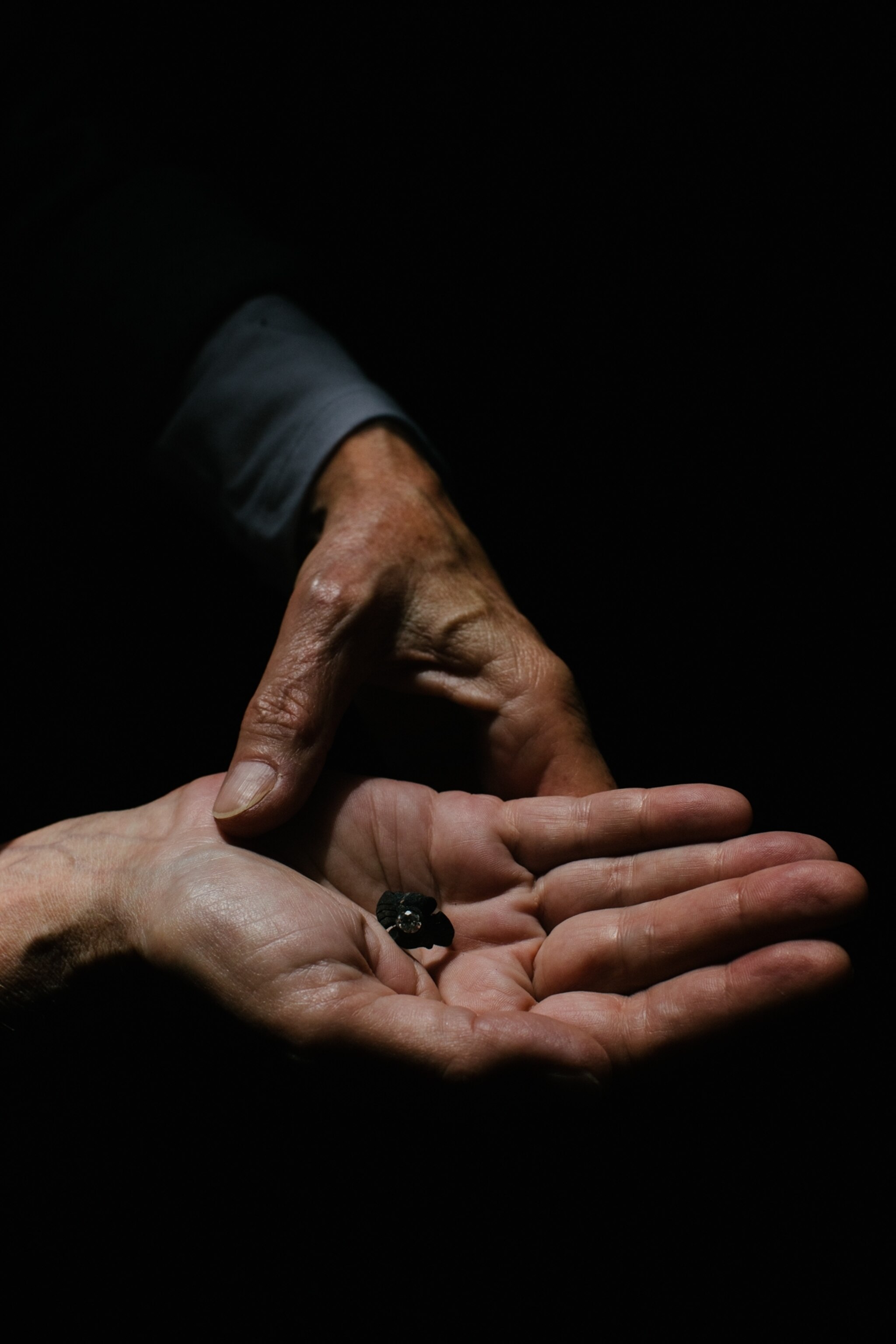
Logan looked around at the deep layer of rubble and his grin threatened to break his face. “Look at this house. I mean, what are the odds?”
Libby had hoped she might find remains of her cats, too, but the state of her house made that unlikely. She walked around the perimeter, dropping bouquets in for each cat: one in the guest room, where Mandu liked to hide under the couch; another where Dali slept, at the corner where her bed had been; the last in the living room, where an urn had held the ashes of the previously deceased Miss Kitty. Logan removed his hat, pressed it to his chest, and lowered his gaze.
Libby walked out of Oak Valley with a parrot sculpture from the garden, a singed page from a commentary on the New Testament, and her diamond ring. Logan, still grinning, and Libby, still stunned, followed Highway 99 toward the center of Talent. Before they’d made it two blocks, a police car pulled up next to them. An officer peered out of the passenger window at the older woman, the young man, the baby stroller with a shovel sticking out of it, and Trace happily sucking on his bottle. “What were you guys doing in there?”
Libby approached the window. “Want to hear a story?”
The officer turned off his car and stepped out. As the story unfolded, he stared at Libby. She held out the ring, and he took it carefully between his fingers. “That’s a miracle,” he said. “That’s a bona fide miracle.”
He handed it back to her. “Holy smokes.”
After he pulled away they kept repeating the story to themselves until it began to feel like lore—the kind of hopeful legend people pass around after a catastrophe to assure themselves not all was lost. “What are the odds?” Logan asked again and again.
“How nice does it feel to laugh?” Libby said.



